Pop-up shop helps get basic items to refugees. We could do the same for L.A.’s homeless people
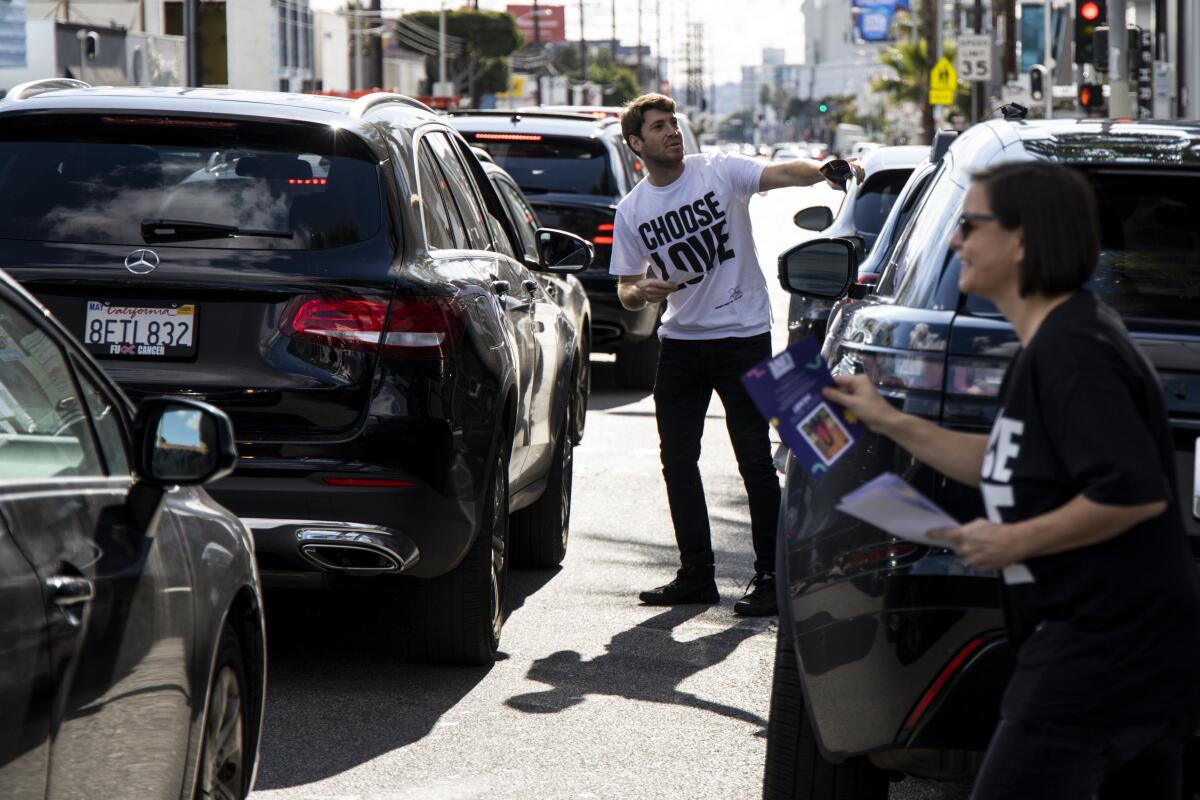
- Share via
I have so much stuff. My closets are stuffed with my stuff. My drawers are stuffed, too. My kitchen cupboards and my fridge are full.
All around me are people who have so little.
They are living in tents, right now in the cold and sometimes also in the howling wind and rain.
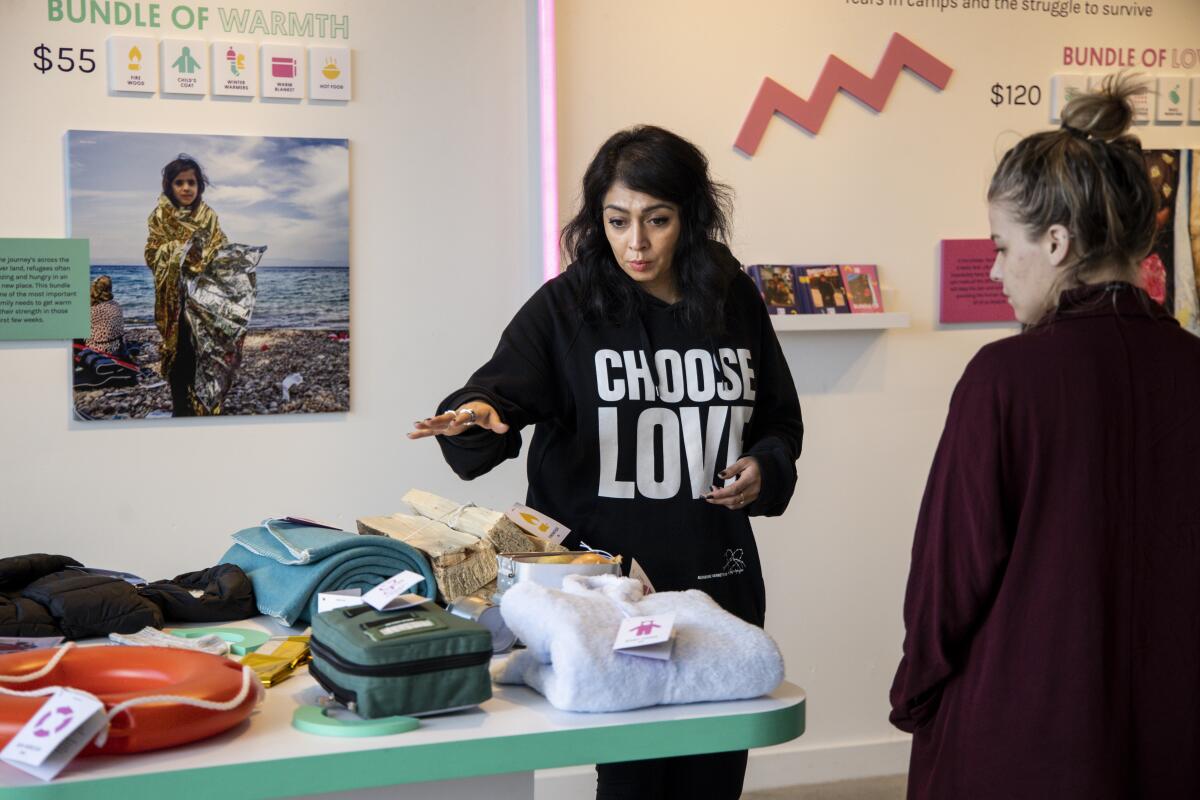
They are lying on hard pavement under thin blankets and garbage bags. I can’t traverse my neighborhood on foot without stepping around their bodies on the sidewalks. I know of at least two people currently living in their vans on my block.
I’ve seen so many people lately shivering and shaking in dirty, sodden clothes on our city streets. I see them as I drive sealed inside my warm car, or as I walk my dog, who sleeps on a warm bed and never goes hungry.
The vast majority of those I love the most in my life have far more than they need. What I could have bought and wrapped up for them for Hanukkah or Christmas would have been cherries on top, icing on the cake. And generally I enjoy that kind of shopping, purely to spread pleasure and joy.
But I could not rev up my consumer spending spirit this season. I couldn’t muster enthusiasm to buy more things for people who don’t need more things. Not with all this need staring me in the face daily.
That’s why I was drawn to the concept of a pop-up store that appeared in L.A. for the big spending stretch between Thanksgiving and Christmas. Its aim was to get people to buy not for those of us who have everything but rather for those who lack even those things so very basic that we take them for granted and don’t think of them as gifts anyone should have to bestow.
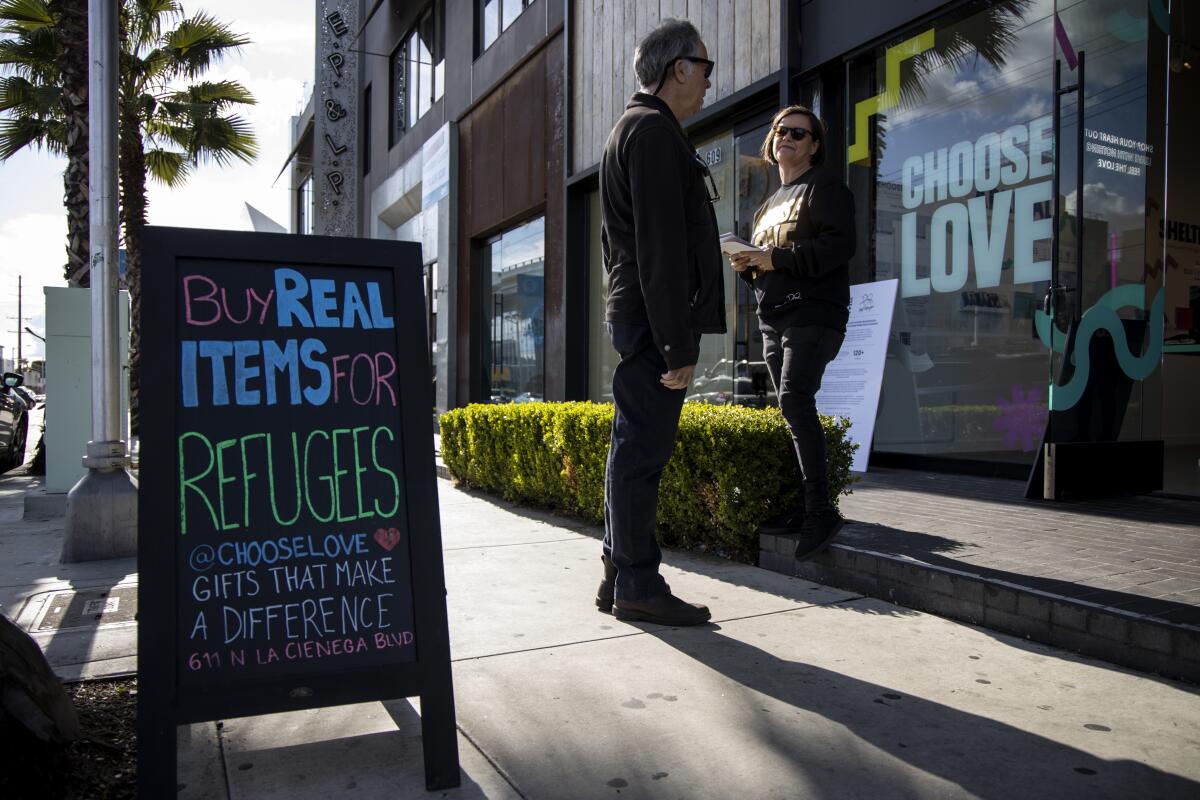
I arrived at the Choose Love shop on La Cienega Boulevard on its last day open, Christmas Eve, as people were walking by carrying glossy shopping bags from nearby Melrose Avenue.
And if I hadn’t known better, glancing in through the big glass windows, I could easily have mistaken it for yet another designer boutique — the spartan kind that you know is very expensive because only a handful of small items are arrayed on big tables in a large space in a high-rent neighborhood.
But the sign on the door said: “Shop your heart out. Leave with nothing. Feel the love.”
And those items on the big tables? Emergency blankets, children’s boots, firewood, flashlights, diapers.
Choose Love pop-ups appeared this past month in London, New York and L.A. They were created by Help Refugees, a celebrity-promoted British nonprofit that started as a hashtag of that plea on social media four years ago. The organization’s goal is to help refugees all over the world, including Syrian refugees in Europe and Central American refugees at the U.S. border.
The donations it brings in get doled out to over 120 projects trying to meet refugees’ needs. They help fund sea rescues, cellphones to help family members communicate, toilets and showers, rent, classes to teach refugees new languages or train them for new jobs.
I immediately imagined the possibilities of a similar storefront, set up as a clearinghouse to funnel contributions to the organizations most successfully working to help those living on our own streets. Because that is our most pressing crisis here — with nearly 59,000 people at last count homeless in our county and more than 36,000 homeless in our city and unhoused people dying on our streets each day and the numbers climbing, not going down.
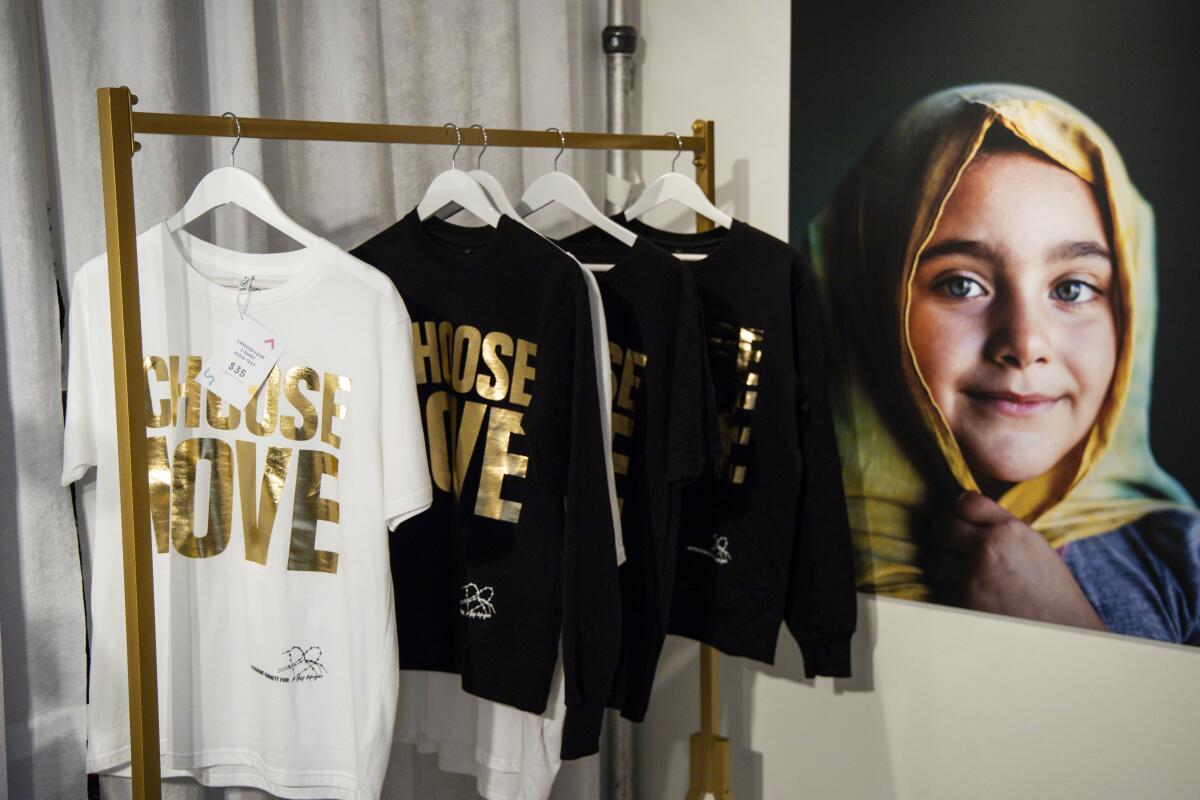
And yet a lot of us who want to help aren’t sure how to do so most effectively.
The Choose Love shop was set up to educate. While I was there, its all-volunteer staff gave those who came in tours to help them understand both the plight of refugees and how the pop-up store worked.
The space was split up into three sections — arrival, shelter, future — with items that refugees would need at each step of their journeys.
On the arrival table, for instance, you could give $10 to supply a warm blanket or $15 for a child’s coat or $5 for a hot meal. Each item carried a description, as in: “A decent meal counts for a lot. Families living in camps often face hours of queueing for low-quality food rations. This gift gives people a nutritious meal to share with the ones they love.”
You could also donate a variety of aid to help refugees at the various stages — such as an $80 “Bundle of Hope” to provide refugees who are getting settled in a new country with mental health care, education for children and youth and support for women. And you could get a card to present your donation as a gift to someone on your shopping list.
For $865, you could donate all the items in the store — which I watched Ross MacDonald, the bassist for a British band called The 1975, do while I was there. I also watched people come in and give much smaller amounts: $10, say, to help with lighting and power at the refugee camps. I watched a young woman who is currently unemployed and short on cash hand over $10 for diapers.
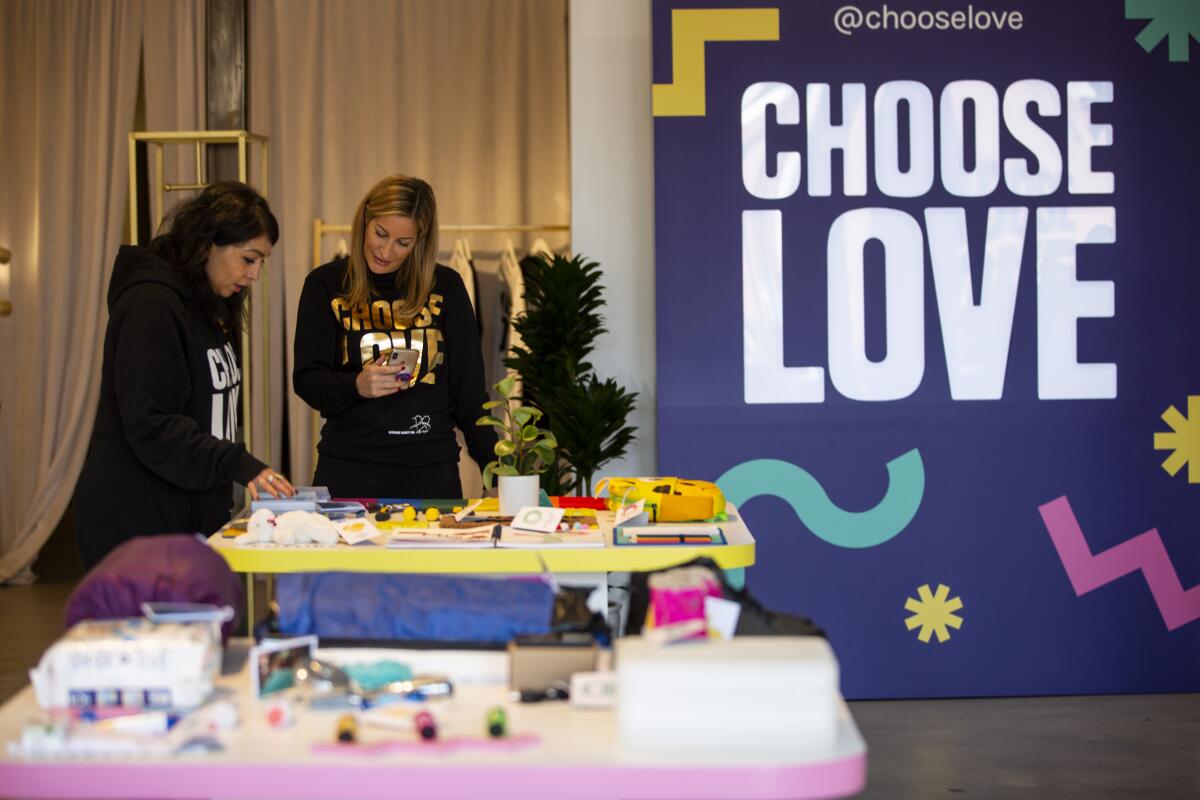
I’ve written a lot in this column about how I think we each have to find our own ways to help the people on our streets who clearly are not getting the help they need. I’m aware that the crisis cannot be tackled purely in this one-on-one way because it is so big and encompasses such a tangle of issues — including addiction and mental illnesses, whose erratic effects make many people in this city fearful and anxious. I’m also aware that major changes have to be made societally — and that those in power need to take the lead, though I think we must pressure them to do so.
But I also think that a lot of people don’t help because they don’t know how to help, and because all the problems just seem overwhelming and far too big for one person to contribute anything of consequence.
That’s why I liked seeing the items laid out on the tables at Choose Love and why I’d like to see the model replicated but focused on the many thousands living on our streets, some of whom at least are also refugees of a kind.
The pop-up made the gaps in care tangible.
A blanket. Socks. Gloves. A winter hat. Cans of food. Money for rent. Money for treatment.
Human needs identified and ready to be met on a human scale.
More to Read
Sign up for Essential California
The most important California stories and recommendations in your inbox every morning.
You may occasionally receive promotional content from the Los Angeles Times.











